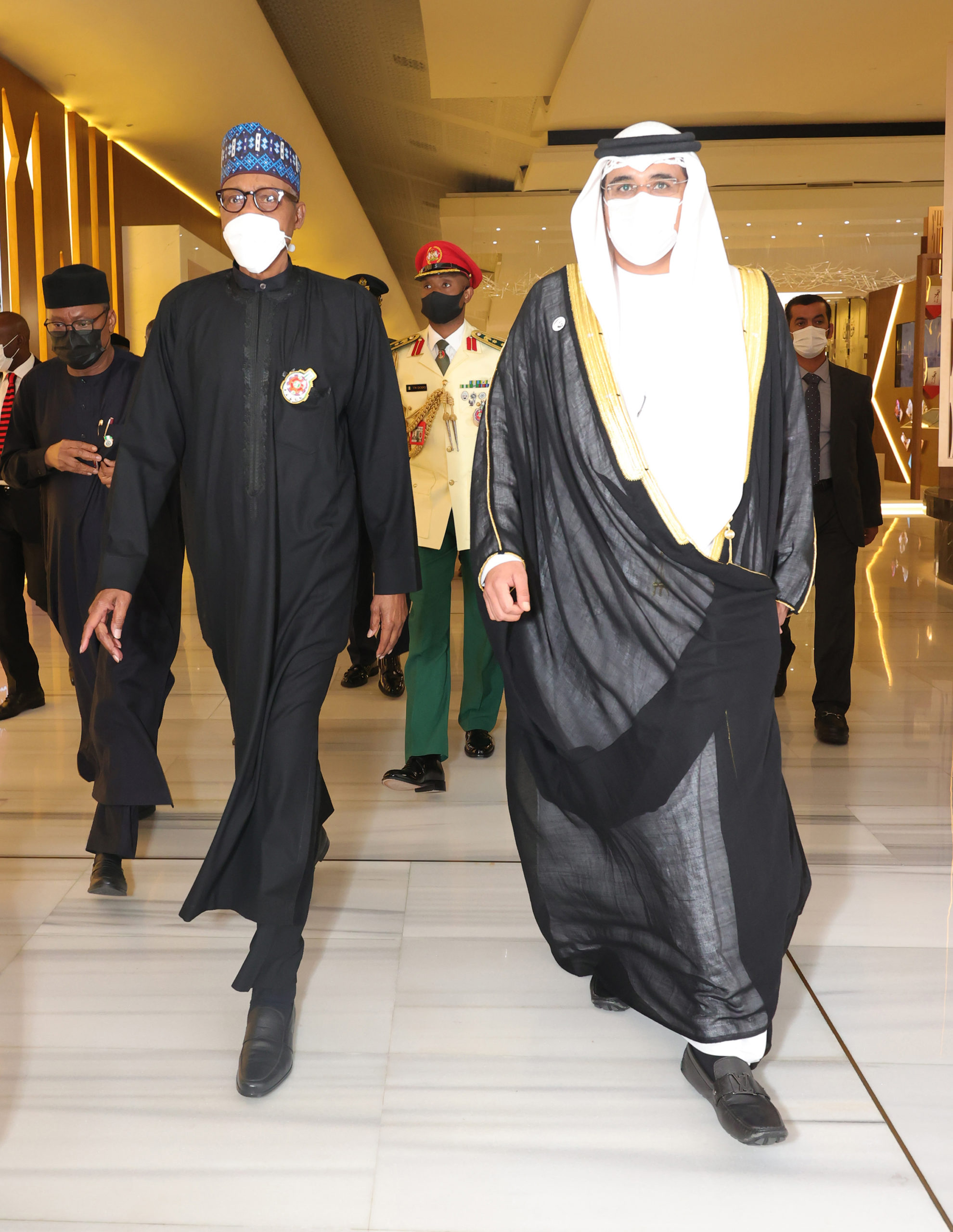Buhari’s Dubai visit: Matters arising
President Muhamadu Buhari left Abuja for Dubai last Wednesday to attend the ongoing EXPO 2020, hosted by that emirate being one of the United Arab Emirates (UAE). The long running show which has as its theme ‘Connecting Minds, Creating the Future’, is billed to last for four months, which is from October 1 2021, to […]

PRESIDENT BUHARI ARRIVES DUBAI FOR EXPO 2020 PIC 5&6. L-R; President Muhammadu Buhari receives by the UAE Ambassador to Nigeria, Dr Fahad Obaid Al Taffaq as President arrives for the EXPO 2020 in Dubai, United Arab Emirates (UAE). PHOTO; SUNDAY AGHAEZE. DEC 2nd 2021
President Muhamadu Buhari left Abuja for Dubai last Wednesday to attend the ongoing EXPO 2020, hosted by that emirate being one of the United Arab Emirates (UAE). The long running show which has as its theme ‘Connecting Minds, Creating the Future’, is billed to last for four months, which is from October 1 2021, to March 31 2022. It was originally scheduled to run from October 20 2020 to March 31, but was postponed due to the COVID-19 pandemic crisis. President Buhari (should have returned home by the time you read this piece), was there to lead Nigeria’s drive for foreign investments through the show, which features series of exhibitions of leading edge technology, products and processes, as well as highlights of arts and cultures of various countries. Nigeria is participating as one of the 190 countries of the world.
For the UAE, the show is serving a dual purpose. In one vein the country is using the show to promote further, its charm on the world while on the other hand and more importantly, it is commemorating the 50th anniversary or Golden Jubilee of its independence from Britain in 1971. Hence the UAE is killing two birds with one stone – a dispensation which in any context is good thinking, especially when the community has in good measure, what it needs to flaunt itself.
Reportedly, the President travelled along with a huge retinue of ministers and other aides in a carnival like manner, which in fact ordinarily translates into a robust representation for Nigeria at the global show. The poignancy of the President’s visit to the show, is accentuated by the fact that Nigeria also has its own pavilion at the show. The normal expectation from such an outing is therefore that the Buhari delegation will return to the country with a significant haul of dividends in foreign investments, as well as some takeaways in respect of lessons from Dubai’s road from a desert community just 50 years ago, through breath taking developmental strides, to its current dizzying heights of transformation. Today Dubai and the entire UAE constitute a marvel location, which provides unequalled levels of good governance and basic comfort for a significant cross section of its inhabitants, who are drawn from about 200 countries of the world, by official count.
Exploring the circumstance of the Dubai visit by Buhari and delegation during a most auspicious time of that country’s independence anniversary, raises the considerations in respect of comparing the UAE with Nigeria. While the two locations may be far flung from each other geographically, they both still share a lot in common. This comparison may even be more telling if it is considered that Nigeria could have been more endowed at the time of independence than the UAE. In the first place both Nigeria and the UAE were both colonised by Britain hence shared the common pains of colonial rule and exploitation. While Nigeria gained independence on October 1 1960, the UAE became free from the same colonialist on December 2 1971. Both countries have oil as one of the most significant resources for national development even at the time of independence, with the commodity still playing pivotal roles in their economies. Both economies depend significantly on oil revenue for national development.
The difference is that the contribution of 3.7 million barrels of oil per day to the economy of the UAE has been brought from 50% to less than 1% for Dubai and the rest of the UAE from over 85% to less than 30%. In contrast, in the Nigerian situation the same commodity contributes just 9% of the GDP, but 95% of foreign exchange and over 60% of government revenue. Further clarification between the two countries betrays the fact that while the UAE invests its oil wealth in building the society’s fabric comprising infrastructure and people friendly welfare schemes, the latter – Nigeria fails to have a grip on its own largesse, leaving it to be frittered away through fraudulent practices, corruption and bare-faced oil theft. Even as the largest producer of oil in Africa, Nigeria’s oil revenue seems to manifest impact only in official records and daily swelling bank accounts of public officials and their cronies.
Hence these differences between them place them differently today in the global ranking of countries. While Nigeria is still wallowing in the zone of the stagnant countries, the UAE now operates in the pantheon of world beaters as far as ranking of human habitation and quality of life are concerned. Hence while the UAE and Dubai in particular is a most sought after destination, Nigeria is a place where a wide cross section of its citizens – especially elements among the youth component of the citizenry, are daily looking for opportunities to escape, even at significant personal risk to them.
It is therefore of significant public interest, what the Buhari visit to the UAE offers Nigeria. Even if the narrative shall leapfrog over historical comparison, the opportunity of such a high brow visit to EXPO 2020 should translate into tangible deliverables from the government to the long suffering Nigerian citizenry, not some bland pronouncements that provide no traction for the country’s developmental aspirations.
